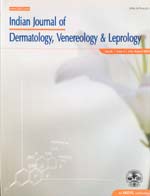
|
Indian Journal of Dermatology, Venereology and Leprology
Medknow Publications on behalf of The Indian Association of Dermatologists, Venereologists and Leprologists (IADVL)
ISSN: 0378-6323
EISSN: 0378-6323
Vol. 74, No. 3, 2008, pp. 226-229
|
 Bioline Code: dv08092
Bioline Code: dv08092
Full paper language: English
Document type: Research Article
Document available free of charge
|
|
|
Indian Journal of Dermatology, Venereology and Leprology, Vol. 74, No. 3, 2008, pp. 226-229
| en |
Comparison of potassium hydroxide mount and mycological culture with histopathologic examination using periodic acid-Schiff staining of the nail clippings in the diagnosis of onychomycosis
Shenoy, M. Manjunath; Teerthanath, S.; Karnaker, Vimal K.; Girisha, B.S.; Krishna, Prasad M.S. & Pinto, Jerome
Abstract
Background: Onychomycosis is a common problem noticed in clinical practice. Currently available standard laboratory methods show inconsistent sensitivity; hence there is a need for newer methods of detection.
Aims: This study involves comparison of standard laboratory tests in the diagnosis of onychomycosis, namely, potassium hydroxide mount (KOH mount) and mycological culture, with histopathologic examination using periodic acid-Schiff (PAS) staining of the nail clippings.
Methods: A total of 101 patients with clinically suspected onychomycosis were selected. Nail scrapings and clippings were subjected to KOH mount for direct microscopic examination, culture using Sabouraud′s dextrose agar (with and without antibiotics) and histopathologic examination with PAS staining (HP/PAS). Statistical analysis was done by McNemar′s test.
Results: Direct microscopy with KOH mount, mycological culture, and HP/PAS showed positive results in 54 (53%), 35 (35%), and 76 (75%) patients respectively. Laboratory evidence of fungal infection was obtained in 84 samples by at least one of these three methods. Using this as the denominator, HP/PAS had a sensitivity of 90%, which was significantly higher compared to that of KOH mount (64%) or mycological culture (42%).
Conclusions: Histopathologic diagnosis with PAS staining of nail clippings was the most sensitive among the tests. It was easy to perform, rapid, and gave significantly higher rates of detection of onychomycosis compared to the standard methods, namely KOH mount and mycological culture.
Keywords
Culture, Onychomycosis, Periodic acid-Schiff staining, Potassium hydroxide mount
|
| |
© Copyright 2008 Indian Journal of Dermatology, Venereology and Leprology.
Alternative site location: http://www.ijdvl.com
|
|
